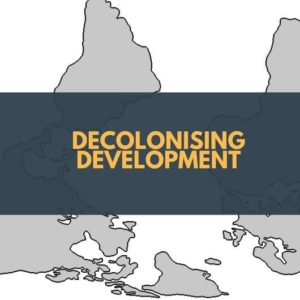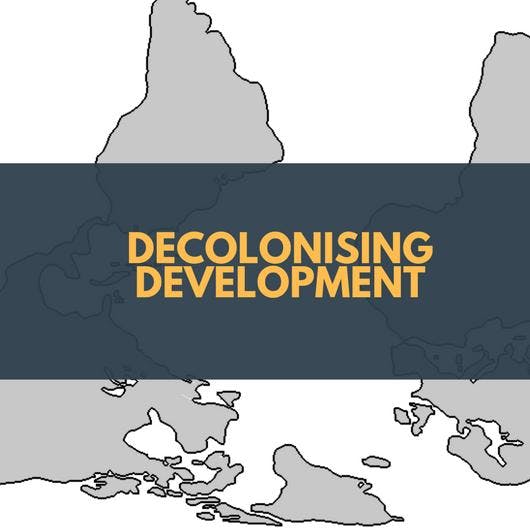A guest post by Marion Osieyo
 I helped organise and lead a conversation on decolonising development with London International Development Network, LSE International Development Society (DESTIN), and Tobi Ijitoye last month in London. We convened this conversation to explore what decolonising development means for our everyday work as international development practitioners.
I helped organise and lead a conversation on decolonising development with London International Development Network, LSE International Development Society (DESTIN), and Tobi Ijitoye last month in London. We convened this conversation to explore what decolonising development means for our everyday work as international development practitioners.
Decolonising Development is a complex problem in various ways. In his book, Solving Tough Problems, Adam Kahane defines three types of complexity that make problems tough:
- dynamic complexity: the extent that cause and effect are far apart in space and time
- generational complexity: the extent that the future is unfamiliar and unpredictable
- social complexity: the degree of mutuality between people in terms of assumptions, values, and rationales
Decolonising Development is a highly dynamic, generational, and socially complex problem. The initial cause and current effects are far apart in space and time, the future(s) arising from colonial power dynamics are unfamiliar and unpredictable and people tend to have divergent, often adversarial, assumptions, values and rationales on the problem.
As with the nature of complex problems, there are no preset solutions. Working on and talking about decolonising development requires different ways of being and relating so we are able to find answers which respond to our context, our relationships, and the unfolding nature of the problem. The challenge was for me to design a space that would invite others to not only share insights but take responsibility for creating the dynamics of the room. In other words, to *be* the space.
As the host, I sought to work with the complexity of the issue in three ways:
- reducing dynamic complexity by opening the conversation with a group discussion on specific every day situations of colonial power dynamics. This was to reduce the space as much as possible between cause and effect.
- welcoming generational complexity by asking simple, powerful questions that welcomed rather than tried to control the unpredictable and unfamiliar futures.
- stewarding social complexity by tapping into people’s intentions to have a fully engaged and committed conversation. I initiated four values for being in the conversation (known as Practicing the Breath) in a way that allowed people to diverge in opinions and assumptions but remain committed to holding the space for each other, however uncomfortable.
Click here to see the PDF presentation of questions I used to initiate the conversation at different turning points. Whilst decolonising development cannot be solved over one conversation, I hope people can be inspired to lean into its complexity by creating this space in their daily work.
Marion Osieyo is a writer and is currently the SDG Hub Manager at the World Wildlife Fund UK. Check out her website here.
***
Click here to read Grace Labeodan’s reflections following the “Decolonising Development” dialogue.
***
Related Posts
White supremacy, black liberation, and global development: The conversations we’re not having



Loved this! Why did I not know about this sooner?! Anyhow this question and it’s troubling corollaries are so deep and powerful. In terms of the practice of development being colonial, we can point to how projects are managed/governed from donors to executors in respective countries. I lives that reality for years in the Caribbean as a project implementer. Recently the decision to hike fuel prices in Haiti by 38% on the say so of the IMF caused rioting, loss of life and the resignation of the Prime Minister. This broader discussion comes to mind because of the clear willful ignorance of societal realities with this policy prescription and the weak, proscribed position of power the Haitian government has vis a vis the IMF. There has been much precedent but it was ignored.
The issue of agency goes without saying, but more fundamentally I think we can’t do much to alter this deep seated and stubborn issue unless and until the former colonized place much more effort into collaboration with each other. The practice of this over time may enable a different power dynamic as well as a different psychological positioning for all parties including the western development community